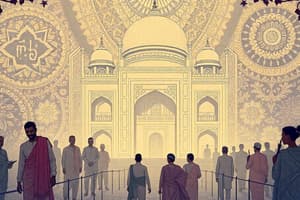Podcast
Questions and Answers
What is a key aspect of India's political system due to its cultural and linguistic diversity?
What is a key aspect of India's political system due to its cultural and linguistic diversity?
Which political party played a significant role in shaping India's post-independence politics?
Which political party played a significant role in shaping India's post-independence politics?
Which factor presents unique challenges for maintaining democratic citizenship among diverse groups in India?
Which factor presents unique challenges for maintaining democratic citizenship among diverse groups in India?
What type of political system does India operate under?
What type of political system does India operate under?
Signup and view all the answers
What has been a challenge for India despite the expansion of agriculture and the emergence of scientific personnel?
What has been a challenge for India despite the expansion of agriculture and the emergence of scientific personnel?
Signup and view all the answers
What is a significant aspect of modern India when considering its history, borders, institutions, and economic development?
What is a significant aspect of modern India when considering its history, borders, institutions, and economic development?
Signup and view all the answers
Which of the following leaders was instrumental in India's non-violent independence movement?
Which of the following leaders was instrumental in India's non-violent independence movement?
Signup and view all the answers
What was the primary principle established by the Indian Constitution upon its ratification in 1949?
What was the primary principle established by the Indian Constitution upon its ratification in 1949?
Signup and view all the answers
Which of the following best describes the cultural diversity of modern India?
Which of the following best describes the cultural diversity of modern India?
Signup and view all the answers
Which of the following best describes the economic development strategy of modern India?
Which of the following best describes the economic development strategy of modern India?
Signup and view all the answers
What is the primary form of government in modern India?
What is the primary form of government in modern India?
Signup and view all the answers
Which of the following challenges has modern India faced in addressing its cultural diversity?
Which of the following challenges has modern India faced in addressing its cultural diversity?
Signup and view all the answers
Study Notes
Understanding Modern India
Introduction
Modern India refers to the current form of India, which gained its independence from British rule in 1947. Understanding modern India involves exploring various aspects, including its independence movement, constitution, cultural diversity, economic development, and political system.
Independence Movement and Constitution
The independence movement was characterized by non-violent civil disobedience led by leaders such as Mahatma Gandhi and Jawaharlal Nehru, who sought to establish India as a sovereign and secular democracy. The Indian Constitution, ratified in 1949, established the country's legal framework, outlining fundamental rights, directive principles of state policy, and provisions for government structures.
Cultural Diversity
India is home to immense cultural diversity, with various languages, religions, and ethnic groups coexisting within its borders. Despite this diversity, efforts have been made to instill a sense of nationhood among the population and address challenges arising from social legislation and regional tensions.
Economic Development
Modern India's economic development has involved a mix of socialist and capitalist policies, with import substitution strategies designed to promote domestic manufacturing through tariffs and subsidies. While these policies have led to some successes, such as the expansion of agriculture and the emergence of a large pool of scientific and engineering personnel, challenges remain in areas like poverty reduction and combating corruption.
Political System
India's political system is characterized by a federal structure that has evolved around cultural and linguistic diversity. The country operates under a constitutional republic with regular elections, which presents unique challenges for maintaining democratic citizenship among diverse groups. The Indian National Congress party, founded during the independence movement, played a significant role in shaping India's post-independence politics.
Conclusion
Understanding modern India requires examining various aspects, including its history, the impact of colonialism on its borders and institutions, and the current state of economic development. Despite challenges, India continues to be an influential global power with substantial potential for future growth.
Studying That Suits You
Use AI to generate personalized quizzes and flashcards to suit your learning preferences.
Description
Test your knowledge on modern India by exploring its independence movement, constitution, cultural diversity, economic development, and political system. Learn about key figures like Mahatma Gandhi, the Indian Constitution, economic policies, and the political landscape of post-independence India.




